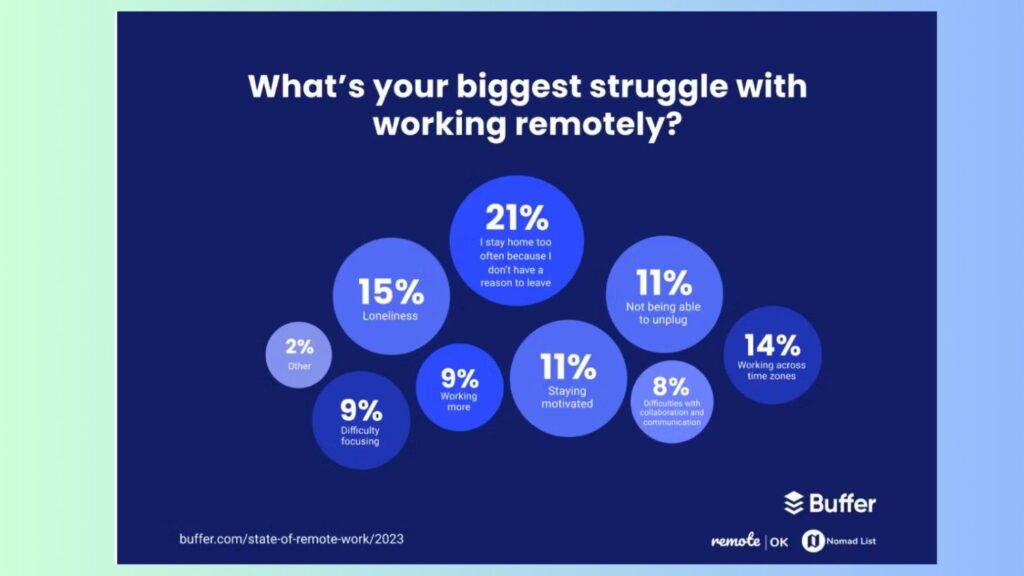With remote work now a common reality, organizations face unique challenges in maintaining engagement and connection within their teams. Managing employees who are spread across different locations, time zones, and even cultural backgrounds can make it difficult for companies to build strong bonds, drive motivation, and ensure productivity. This blog will share practical strategies for enhancing remote employee engagement, emphasizing how HR management certification can help professionals develop the skills needed for this challenge.
Importance of Employee Engagement in Remote Work
In remote settings, where face-to-face interactions are limited, employee engagement becomes a cornerstone of organizational success. Engaged employees feel connected to their roles, positively affecting their motivation and dedication, reducing turnover and helping companies retain talent.
High engagement in remote work also drives accountability, enabling employees to focus on their objectives. The lack of direct supervision in remote work makes engagement all the more essential, as engaged employees are more self-directed and motivated to fulfill their responsibilities without constant oversight.
Common Struggles of Remote Work
Remote work offers flexibility and convenience, but it also comes with its own set of challenges. Many employees face difficulties in adapting to this new way of working, which can impact their productivity and overall job satisfaction. Understanding these common struggles can help organizations implement effective strategies to support their remote teams. According to Buffer, 11% of remote workers report that staying motivated is a major challenge, highlighting the common struggle to maintain focus outside a traditional office environment.

Let’s explore five prevalent challenges that remote workers encounter.
- Isolation and Loneliness: Working from home can lead to feelings of isolation, as employees miss the daily interactions and camaraderie of an office environment. The lack of face-to-face communication may cause them to feel disconnected from their colleagues, potentially affecting their mental well-being and motivation.
- Work-Life Balance: While remote work allows for flexibility, it often blurs the lines between professional and personal life. Many employees struggle to establish clear boundaries, leading to longer working hours and difficulty in disconnecting from work. This imbalance can result in burnout and decreased job satisfaction.
- Communication Challenges: Effective communication is crucial for collaboration and productivity, but remote work can hinder this process. Misunderstandings may arise due to the lack of non-verbal cues, and relying on digital communication tools can lead to information overload or delayed responses, making it harder to stay aligned with team goals.
- Distractions at Home: Working from home presents various distractions, such as household chores, family responsibilities, and personal devices. These interruptions can disrupt focus and reduce productivity, making it challenging for employees to maintain their usual work output.
- Technology Issues: Remote work heavily relies on technology, and technical difficulties can create significant roadblocks. Employees may face challenges with unstable internet connections, software compatibility, or accessing necessary tools, which can hinder their ability to perform tasks efficiently and lead to frustration.
Effective Ways to Increase Employee Engagement in Remote Work
Building engagement within a dispersed workforce requires an intentional, structured approach. Without the physical presence and shared office environment, companies must find new methods to foster a sense of belonging, trust, and motivation. Below, we explore proven methods to ensure remote employees remain connected, empowered, and dedicated.
Build Strong Communication Channels for Remote Teams
A clear, consistent communication strategy fosters engagement among remote teams. Remote work environments can often feel isolating, so creating reliable communication channels helps bridge that gap. Popular tools have emerged as essential for real-time collaboration and updates, such as:
- Slack: This platform allows seamless team messaging and supports channel creation for various projects, departments, or topics, promoting transparency and teamwork. It also features integrations with numerous apps, enabling teams to customize their workflow.
- Zoom: Effective for team meetings and one-on-one video calls, Zoom’s video conferencing options allow for screen sharing, virtual backgrounds, and breakout rooms, enhancing remote collaboration. Its recording feature also enables teams to revisit discussions when needed.
- Microsoft Teams: Offering both messaging and document-sharing features, Microsoft Teams integrates with Office 365, making it convenient for organizations already using Microsoft’s tools. The platform also includes a calendar function, which streamlines scheduling and enhances team coordination.
- Trello: This project management tool allows teams to organize tasks visually using boards, lists, and cards. Trello’s collaborative features enable team members to comment, attach files, and track progress, ensuring everyone stays aligned.
- Asana: Another effective project management tool, Asana helps teams plan, organize, and track their work. Its task assignment and deadline features promote accountability, while its reporting tools provide insights into project progress.
Each of these platforms enables timely communication and helps remote employees feel informed and included in team discussions, making it easier to build a strong virtual network.
Foster a Collaborative Culture Despite Distance
To maintain a collaborative culture in remote work, companies must intentionally create opportunities for teamwork and cross-functional projects. A collaborative approach means encouraging employees to work together on shared goals, building bonds across virtual boundaries. Virtual collaboration tools like shared workspaces, collaborative documents, and regular team meetings help sustain a culture of cooperation.
Companies might also consider rotating team members through different projects, allowing employees to interact with various departments. This cross-collaboration strengthens relationships, enhances knowledge sharing, and supports a dynamic, cohesive company culture.
Empower Employees with Autonomy and Trust
Autonomy is a powerful motivator in remote work environments. Allowing employees the freedom to make decisions about their tasks shows that the company trusts them, which can foster a sense of ownership and accountability.
When employees have control over their schedules and workflows, they’re more likely to perform well. However, empowerment goes beyond simply letting employees work independently.
It involves providing them with the resources and tools they need to do their job effectively. Managers can support autonomy by setting clear expectations, ensuring employees understand their objectives, and providing feedback when needed without micromanaging.
Trusting employees to make decisions in their daily work encourages innovation and allows them to feel valued for their unique contributions. This trust not only improves engagement but also builds a more resilient, adaptable workforce prepared to tackle challenges creatively.
Recognizing and Rewarding Employee Achievements Remotely
Celebrating achievements is essential for maintaining morale, especially in remote settings where employees may feel isolated from their accomplishments. Recognizing milestones and contributions helps employees see their impact, fostering pride in their work.
- Gift Cards: Offering virtual gift cards is a practical way to show appreciation. Employees can choose their rewards, which adds a personal touch.
- Public Recognition: Creating a “Wins of the Week” newsletter or sharing achievements in team meetings can help employees feel valued and connected.
- Professional Development Opportunities: Providing access to specialized training or certifications not only rewards employees but also supports their growth.
These rewards help reinforce a sense of purpose, which can be a strong motivator in a remote setting.
Create Virtual Social Opportunities to Boost Morale
To cultivate a positive work atmosphere remotely, consider hosting virtual social events. Activities like virtual coffee breaks, team trivia, or even online fitness sessions provide a space for team members to unwind together and build camaraderie. Virtual gatherings add an element of fun, enabling employees to connect on a personal level, which can reduce feelings of isolation and make remote work feel more enjoyable.
Provide Access to Professional Development and Growth
Investing in professional growth is a significant way to show employees they’re valued, and in remote work settings, it’s more important than ever. Providing accessible learning resources demonstrates that the organization is invested in the future of its team members.
- Identify Skill Gaps: Determine areas where employees need further training.
- Offer E-Learning Options: Platforms like LinkedIn Learning or Coursera provide flexible courses on a wide range of topics.
- Encourage Skill Sharing: Invite employees to lead training sessions on their areas of expertise to build a culture of mutual learning.
- Cover Costs for Certifications: Investing in certifications or advanced learning opportunities demonstrates a long-term commitment to employee development.
Access to continuous learning keeps employees engaged and ensures the team remains well-prepared for evolving challenges.
Balancing Flexibility with Productivity Goals
Remote work often offers increased flexibility, but without careful oversight, it can blur the line between productivity and downtime. Finding a balance requires setting clear goals and benchmarks that employees can follow without feeling overly restricted.
Many companies are hosting virtual seminars to address this, giving employees strategies to manage their time effectively and stay productive without sacrificing flexibility. A well-structured approach lets employees enjoy the benefits of remote work while also meeting their productivity targets.
Supporting Healthy Boundaries for Work and Personal Life
Maintaining work-life boundaries is critical for the well-being of remote employees. Without physical separation from the workplace, it’s easy to let work spill into personal time, leading to burnout.
Supporting employees by encouraging regular breaks, setting clear end-of-day expectations, and discouraging after-hours emails can create a healthier work environment. Tools like digital time trackers can also help employees manage their workload and feel more in control of their schedules.
How HR Management Certification Seminars Can Support Your Engagement Strategy
HR certification seminars equip HR professionals with the tools to enhance engagement strategies. These seminars provide frameworks for creating an inclusive, motivating remote work culture, which is essential for long-term success.
- Strategic Communication Techniques: Training on HR management offers insights into effective communication practices that ensure clarity and transparency within remote teams.
- Employee Engagement Models: Seminars offer proven engagement models tailored for remote settings, helping HR teams to implement effective programs.
- Performance Monitoring Tools: These certifications cover methods for tracking and improving employee performance without micromanaging, balancing oversight with trust.
- Legal Compliance in Remote Work: HR certification includes updates on regulatory requirements, enabling HR teams to keep the organization compliant while fostering a positive work environment.
- Cultural Sensitivity Training: As remote work often involves diverse teams, training on cultural awareness and sensitivity helps HR leaders manage international and remote teams more effectively.
Investing in HR management training can elevate your team’s engagement strategy, providing the tools and knowledge needed to create a thriving remote workplace. The Institute for Applied Management & Law (IAML) offers comprehensive seminars designed to support HR professionals.
Connect with IAML today to discover how to elevate your HR skills and drive meaningful engagement within your remote teams. Our expert-led resources and training programs are designed to equip you with the strategies you need for success in today’s dynamic work environment. Don’t miss the opportunity to transform your approach to remote workforce management and foster a thriving team culture.




